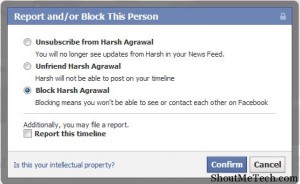Melissa King’s article called “Better Online Living through Content Moderation” argues that internet users should always have the choice to filter what they expose themselves to online. Online harassment has become an increasing problem in the last years, but there are ways to limit this abuse. One common way to avoid stressors on the Internet is to block the user that is doing the harassing. Blocking someone would create a situation where the stalker or abuser cannot see the information of the blocker, and the blocker no longer sees what the abuser posts. This can be very helpful in the process to separate oneself from a perpetrator; however, the American culture tends to look down upon those who exercise that resource.

http://2.bp.blogspot.com/-msOHHotWkc4/UDsMxc6UloI/AAAAAAAAbuU/ARiGQxnWG3M/s1600/Facebook+block+2.jpg
People are constantly pressured to face their problems and to be in a hurry to get over painful experiences. This type of cultural influence can be confusing to those that have conditions like depression or PTSD. Conditions like these cannot be overcome overnight, and they cannot be solved by having to face an unwanted stressor all the time. These conditions have to be treated carefully and cannot be suppressed while coming into contact with triggers. The uneducated public may think that exposure to triggers can aid in recovery; however, being thrown into exposure can cause panic attacks and can heighten the anxiety for that trigger.
Not only people with these conditions, but everyone should have the right to censor their internet exposure without being ridiculed as being too sensitive. In addition to the insensitivity about people blocking triggers on the internet, PTSD can be a result of the bullying online. Caleb Lack, who is a licensed clinical psychologist, argues, “Yes, you can ‘get’ PTSD from Twitter” (King). He goes on to explain, however, that it is the harassment from the users of Twitter that cause this complication, not Twitter itself. It is a common thought that the posts on the internet are empty words that cannot do real damage, but there have been many cases where someone’s life is threatened or someone is bullied for so long that they commit suicide. If something as simple as blocking someone can prevent this from happening, this should be encouraged instead of looked down upon.
In addition to this, people argue that if a user is blocked, they are being silenced. Everyone has the freedom of speech and the right to say what they chose as long as it complies to the law. However, blocking a user does not silence them. They can be heard in every other part of the world, and it is someone’s personal opinion whether they want to listen to it or not.
Although King makes a strong argument that everyone should have the right to filter their internet exposure, she assumes that this cannot be done in private. Even if a user is forced to go through the process of installing an app in order to block someone, this can easily be done without allowing others to see. People may chose to not block someone because they feel the need to stay updated on the situation; however, if this is not the case, the victim may block the abuser in peace.
